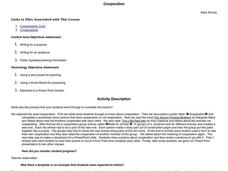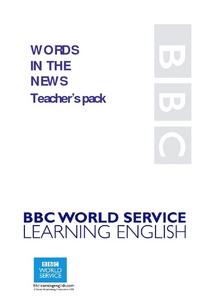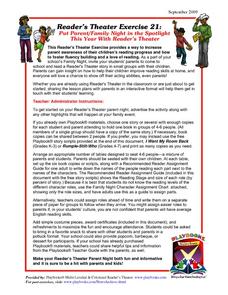Achieve
Dairy Barn
Agriculture is truly a math-based profession! Help the dairy farmer determine the supplies needed to complete his barn. Using given dimensions, learners build equations and use units to determine the correct amount of materials.
Bonneville
Manipulating Design Variables on Solar Heaters
Always strive to make things better. The second of three activities in the Experimenting with Solar Heaters unit has learners design new solar heaters that are more effective compared to the simple models they used in the previous lesson...
Overcoming Obstacles
Clarifying Values
The fourth instructional activity in the Confidence Building module asks participants to think about what they value and how these values influence their decisions. Class members engage in activities that help them identify what they...
Smithsonian Institution
Science Starts With a Question: Energy - Teacher Guide
Get an up-close look at energy transfer. Using a three-part activity, investigators first observe a teacher-led demonstration before building a model marble track to convert potential energy to kinetic energy. Scientists explore six...
Curated OER
Directed and Undirected Free-writing: An Activity in Brainstorming
Let your writers take a break from formal writing and experiment with undirected freewriting. First they'll discuss the difference between directed and undirected freewriting. Then they'll put their knowledge to work and create some...
PBS
Keep Out!
Sound the alarm about a great resource. Scholars first build a simple circuit to learn the basics about electric currents. They then design an alarm system in which a buzzer activates when pressure is applied to a doormat.
Weebly
Symbolism in The Giver
Take two days to examine the symbolism inherent in color, and how this relates to Lois Lowry's The Giver. Small groups first discuss the meaning of colors and then come together as a class to explore the impact of color. The activities...
NASA
Transportation and Space: Reuse and Recycle
What can I use in space? The three-lesson unit has groups research what man-made or natural resources would be available during space exploration or habitation. Team members think of ways that resources can be reclaimed or reused in...
Purdue University
Recycling Paper
Build an appreciation for the green movement by recycling your own paper! Learners participate in a STEM instructional activity by learning about the process of recycling paper and then designing their own models. Their ultimate task is...
Children’s Hospital of Philadelphia
Vaccine History and Research
It all becomes a matter of timing. Groups use a variety of resources to research the history of vaccines by first creating a timeline of vaccine research using leading scientists' work. Learners read articles to develop a story of the...
Bonneville
Simple Solar Tracker
Let the solar cells fight each other for supremacy! Given a functional solar tracker that moves toward light, groups copy the design to build their own devices. They use two sets of solar cells that have reverse polarization, so that the...
NASA
Comet on a Stick
Since you can't go to the comet, bring the comet to you. Young scientists build models of comets using everyday materials and then participate in a simulation of the interaction between the comet and other bodies in the solar system....
Bonneville
Designing a Faster Water Pump
Things can always be made better. The culminating installment in the seven-part Understanding Science and Engineering unit has pupils design their own water pumps. In groups, they build a prototype of a design of their choice, then test...
Curated OER
Communicating at work: Listening strategies and skills
Students play a game of "Gossip" to explain the importance of active listening skills. They learn active listening skills through group discussion, lecture and small group exercises.
Curated OER
Build a Reef
Students build a coral reef, then discover organisms that make up the ecosystem.
Curated OER
Meet the Royal Food Family
Second graders use mini-books, posters, songs, trading cards and sorting activities to explore the five food groups needed for health: vegetables, fruits, grains, milk and meat. They discuss why good nutrition is important.
Curated OER
Summer Safety Activity: Playing with Environmental Print
Students look at the words, symbols, and signs that surround them. For this early childhood lesson plan, students use observational skills as they note the abundance of letters and signs in their world, then apply this awareness to...
Curated OER
How Have World Religions Shaped Who I Am Today?
Learners discuss the different religions that make up the world today. They complete an interest inventory about their belief systems and the influence it has had on their lives. In groups of two, then four, then eight they discuss...
Curated OER
Cooperation
Students, in groups, "Build An Animal where they need to cooperate in order to be successful and then make a storyboard for a Powerpoint presentation.
Curated OER
Words in the News Smoking Ban- 15 February 2006
Students complete vocabulary building exercises before reading an online article. They complete worksheets and an online quiz. They focus on relaltive clauses on the final worksheet. They write a letter about second hand smoke in a...
Curated OER
Recycling Lesson Plan
Students examine the role of choice in a democracy, the choice to participate and not to participate. They take a position on the role of recycling and whether in a democracy people can be forced to recycle. They break into for and...
Curated OER
Memory and Legacy: Building Monuments and Memorials
Students analyze the reasons why groups build monuments and memorials. Using the Holocaust as an example, they reflect on issues that are addressed in monuments related to it. They create a monument of their own and write an essay about...
Playbooks
Reader's Theater Exercise
Here's a great idea for your Parent/Family Night—host a Reader's Theater! Everything you need to organize the night, as well as a K-3 and a 4-7 script, is provided in the packet.
Humanities Texas
Primary Source Worksheet: John T. McCutcheon, “A Wise Economist Asks a Question”
No joke! Kids learn how to read political cartoons using McCutcheon's drawing as a starting point and then progressing to other images found online.























